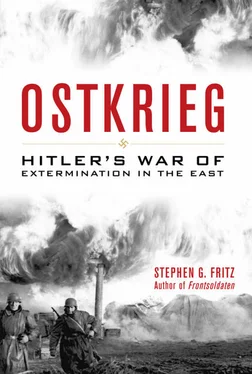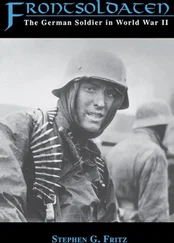The British rejection came swiftly, within the hour, although even now Hitler seemed puzzled by the English attitude and could not quite bring himself to accept it. Although the British had acquiesced in German expansion in 1938, the situation in 1940 differed markedly: making peace on Hitler’s terms now meant recognition of German hegemony on the Continent and the likely end of Britain as a major power. Still, as Goebbels noted, “At the moment the Führer cannot bring himself to accept the British answer.” 9Once again, a British decision had confounded Hitler and confronted him with a dilemma. After he had blundered into war in 1939, the brilliant German military victories had seemed to offer a way out of his strategic, economic, and political impasse. The Germans, however, had only conquered their way into a strategic cul-de-sac, as their victories in 1940 had not secured hegemony in Europe. Now, faced with mounting time pressures from the Anglo-American powers in the west and growing concerns over German dependence on the Soviet Union in the east, Hitler had once more to make a decision.
The key question to be answered regarding Hitler’s decision for war with the Soviet Union is not so much why he chose to attack the Soviet Union—Lebensraum in the east, after all, formed the linchpin of his ideology—as why he chose to attack when he did. Why risk a two-front war at a time when the pact with the Soviet Union had essentially made Germany blockade proof? Why not dispose of Great Britain first, leaving his rear secured for any future action against Russia? And why the seeming urgency in the last week of July, after the failure of his peace overture, to come to a decision? Certainly, his underlying motivation, as it had been since the mid-1920s, was ideological. His entire program depended on securing living space in the east and dealing a death blow to the Jewish-Bolshevik conspiracy allegedly threatening Germany’s existence. A successful attack on the Soviet Union would not only destroy the power of the Jews but also procure for Germany the resources necessary ultimately to challenge the United States for world supremacy. Additionally, a Nazi-dominated Europe would allow Hitler the utopian opportunity to create a racially purified empire and solve the Jewish question for all time.
Originally, Hitler had expected to accomplish this task with Britain as an ally, but, even though British obstinacy forced him to make a detour through Western Europe, he retained a consistent focus on the east. As numerous conversations with Goebbels illustrated, Soviet actions in Poland and in the Winter War against Finland confirmed his racist hatreds, contempt, and determination to prevent the spread of the “Jewish virus” into Western Europe. When in a January 1940 letter Mussolini chastised him for losing sight of his anti-Bolshevik mission, Hitler replied that “only a bitter compulsion” had caused him to cooperate “with this country.” The pact with Russia, Hitler reminded the duce , was merely a tactical and economic necessity until he had safeguarded his rear in the west. For the rest, “Germany and Russia were two [alien] worlds.” Indeed, since late October 1939, Hitler had made no secret of his intention to turn German forces eastward. Above all, he was preoccupied with his two great tasks: achieving space for the German nation and the final confrontation with Bolshevism. Within days of the armistice with France, Hitler told his Wehrmacht adjutant, Colonel Schmundt, and Foreign Minister Ribbentrop that he was playing “with the idea of leading a war against Russia.” 10
The ten days from the failure of his peace offer to the end of July 1940 appear to have been the crucial period during which Hitler conceived the idea of an actual attack on the Soviet Union, with a number of nonideological considerations influencing him. Interestingly, it was not Hitler but Halder who apparently first began to think in concrete terms of action against the Soviet Union. At the end of June, the army chief of staff had been briefed by State Secretary Ernst von Weizsäcker on the political situation and Hitler’s increasing focus on the east. Halder was a close disciple of his predecessor, General Ludwig Beck, and shared his mentor’s staunch anti-Bolshevism and fear that the Nazi-Soviet Pact had opened the way for increased Soviet influence in Eastern Europe and the Balkans. Soviet troop movements and pressure on the Baltic states and Rumania evidently caused alarm in army leaders, even as Hitler momentarily regarded them as nothing more than irritations. The ink was barely dry on the armistice with France when, on 30 June, without direct instructions from Hitler, Halder ordered his staff to study the possibility of a campaign against Russia. Increasingly, too, he saw a connection between British obstinacy and the problem of Russia, with the latter being the key to the attitude of the former. 11
In view of the Red Army’s assertiveness in Eastern Europe, Halder saw the need for “striking power in the east” and, thus, ordered German units transferred to new staging areas in Poland. On 3 July, he requested an examination of the “requirements of a military intervention which will compel Russia to recognize Germany’s dominant position in Europe.” At this point, he envisaged a limited preventive strike that would reduce the Soviet Union to a second-rate power and secure for Germany much of the same territory conquered in World War I: the Baltic states, Ukraine, and White Russia. Halder’s actions sprang not only from his own anti-Bolshevism and fear that Stalin meant to exploit German preoccupation in the west but also from his assessment that London’s attitude rested on hopes in Russia. British obstinacy raised the distinct possibility of a protracted war of attrition and the alarming threat of a repetition of the enemy coalition of 1917. A blow against the Soviet Union would presumably end London’s hopes of continuing the war and alleviate German concerns. 12
Hitler evidently had not yet come to such definitive conclusions. In June, he still expected to reap the fruits of his great military victory over France, including a peace that would leave Germany dominant on the Continent. His anticipation of a global settlement with the British can be seen in his decision in mid-June to disband thirty-nine divisions and reduce the army to its peacetime strength, which would release some 500,000 men for the armaments industry. He also accorded both the Luftwaffe and the navy priority in armaments production, which hardly indicated any intention to launch an immediate war against Russia. Once again, it was Halder who seemed to have his eyes turned to the east. Given the reduced role for the army in the west, on 25 June Halder ordered his staff to study the restructuring of the army with the goal of creating highly mobile “special defense groups” to counter any possible Soviet moves in the Balkans or threats to the important Rumanian oil fields. As thoughts turned to a preventive strike, these mobile forces became the spearheads for a German offensive operation. Ironically, on the same day Halder ordered his study, Hitler had remarked optimistically, “The war in the west has ended… and I shall come, in the shortest possible time, to an understanding with England. There still remains the conflict with the east. That, however, is a task which throws up worldwide problems…. One might perhaps tackle it in ten years’ time…. Now we have our hands full digesting and consolidating what we have obtained in Europe.” 13At the end of June, then, Hitler seems not yet to have turned his eyes firmly toward the east.
What changed the Führer’s mind? Clearly, the failure of the peace offer played a role, as did growing concerns about Russian and American actions. On 21 July, apparently clinging to the illusory hope that a peace party in Britain would even now alter Churchill’s course, Hitler still wavered on what to do, according to notes in Halder’s diary: “No clear picture on what is happening in Britain. Preparations for a decision by arms must be completed as quickly as possible. The Führer will not let the military-political initiative go out of his hand. As soon as situation becomes clear, political and diplomatic procedures will take its place.” Hitler, however, understood that the situation was not likely to clear anytime soon. A cross-Channel attack seemed “very hazardous to the Führer. On that account invasion is to be undertaken only if no other way is left to bring terms with Britain.” Why, however, did England hold out? To Hitler, the answer seemed obvious: “Hope for a change in America…. Puts hope in Russia…. Create trouble in the Balkans through Russia, to cut us off from our fuel source.” Nor did he doubt that the Soviet dictator hoped for a prolonged war in the west: “Stalin is flirting with Britain to keep her in the war and tie us down, with a view to gain time and take what he wants…. He has an interest in not letting Germany get too strong.” 14
Читать дальше












